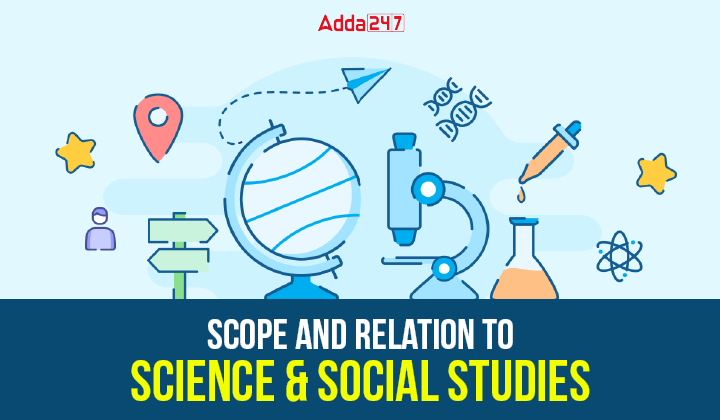The Environment studies is a multi-disciplinary science comprising of various branches of studies like chemistry, physical science, life science, agriculture, health, sanitary engineering etc. Environmental Studies may be an interesting subject having 30 questions in CTET and other State TET Exams. The Environmental Science section divides its questions into two parts: Subject Content which consist of 15 marks and EVS Pedagogy which consist of 15 marks. It is advised is to study the NCERT books from class 1 to 8 of to prepare well for CTET Exam. The current article will give few introductory points on EVS Pedagogy.
SCOPE AND RELATION TO SCIENCE & SOCIAL STUDIES
Environment: Environment is made up two components: biotic and abiotic.
• Biotic component includes plants, animals and micro-organisms and we study all these in biology.
• Abiotic component includes temperature, pressure, heat, energy; air etc. and these are studied in the Physics and Chemistry.
• So, it can be concluded that environment share close relationship with all three streams of natural science.
Environment and Society:
• The society is now awakened towards environmental problems and they are concerned about the quality of environment that has reached to almost its peak.
• The environmental improvement measures being costly and long-term investment of time, money and resources may jeopardies the public interest and the implementation of environmental improvement programmes.
Environment and Politics:
The interaction between environment and society depends largely on the social and political system within which arise the environmental and ecological problems.
• The ecological situation varies from one country to the other and one region to the other because of uneven distribution of natural resources, uneven economic and social development, dissimilarities of demographic factors, varying view points of the government and individuals towards environment etc.
• Continuous but exceedingly increasing rate of rapacious exploitation of natural resources and uncontrolled development by the developed world, monopolistic groups and selfish international companies are responsible for alarming situation of grave environmental crises and ecological imbalance.
• These days few governments lay more emphasis on the social importance of natural resources, environmental and ecological problems and on the urgent need to tackle these problems.
Environment and Resources:
• The present society has to educate the future generation in the light of resources of the country which are to be utilized adequately.
• The resources are fundamental base for the economic growth and development of human beings but their withdrawal from the nature, mode of their uses by human beings and their disposal has enormous adverse effect on the environment. It is, thus imperative to study the linkages between use of resources and the environment.
• The natural resources in the form of matter and energy are of vital significance for the survival of all types of life on the planet. Therefore, the meaning, classification, assessment and evaluation, uses and abuses, conservation and management of all sorts of resources natural or cultural, renewable or non-renewable are very significant aspect of environment.
Environment and Geography:
The field and study of geography is Earth and Man. Earth includes physical, biological, social, cultural and economic components of the environment with reference to man. Thus, geography is the only discipline that can pursue the study of environment and organisms as whole because
• As regards the physical system it is geography that excels other sciences because geographers have the knowledge of structure, geomorphic processes, climate, vegetation and soils while other scientists specialize in only one of those aspects.
• Being an integrating science geography synthesis all the elements and components of planet Earth into body and links the Social Sciences with the natural sciences.
• The geographers besides identifying complex relationship between man and physical environment have the capability of locating the distribution of such relationships in space, mapping them and employing the causes of variations in distribution.
Environment and Health:
Health of a person is the result of interaction of a large number of influences upon the person. These can be considered as genetic influences, behavioral influences and environmental influences
i. Genetic Influences: Genes determine the physical and physiological characteristics of an organism. The inherited abnormalities manifest as the hereditary diseases which are passed on from parents to offspring.
ii. Behavioral Influences: Alcoholism, smoking, use of drugs, tobacco chewing or irregular food habits causing various kinds of health problems.
iii. Environmental Influences: Various components of the environment exert their influence on our health. These can be grouped under physical, chemical, biological, sociological and psychological factors.
1. Modes of Transmission of Diseases:
(A)Contact Transmission: Some diseases can be transmitted either by direct physical contact with the infected person or the causative agent can be transmitted to the host indirectly by contact with the infected articles.
(B)Vector Transmission: Vector is a carrier of pathogen. Mosquito spend a part of their life cycle in water and it works as vector for diseases like Dengue, Malaria, and Chikungunya.
2. Sanitation and Other Problems in Habitations:
• Unregulated growth of habitations, inadequate infrastructure facilities and lack of proper facilities for collection, transportation, treatment and disposal of wastes have all contributed to increased pollution causing health hazards.
• Lack of proper toilets facilities, especially in villages, towns and slum areas of cities does not permit proper disposal of human waste which in turn leads to improper sanitary conditions and health hazards.
• Scarcity of clean drinking water is one of the major causes for the spread of many water borne diseases.
• Poor drainage or improper drainage results in the accumulation of waste water in public places, in villages, towns and cities. Animal excreta and movement of cattle in and out of water pools and puddles spreads this filth over larger areas further causing sanitary problems.
Download Scope And Relation To Science & Social Studies Study Notes PDF




 UGC NET Study Notes for Paper 1, Downloa...
UGC NET Study Notes for Paper 1, Downloa...
 GSET Teaching Aptitude Questions and Ans...
GSET Teaching Aptitude Questions and Ans...
 समुद्र का पर्य�...
समुद्र का पर्य�...












